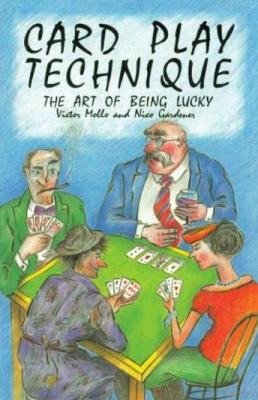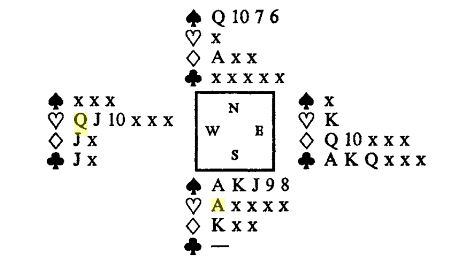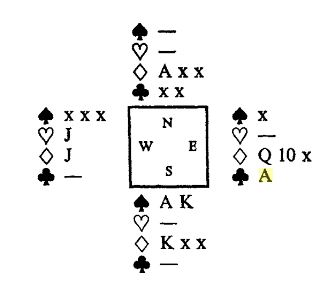Source: Card Play Technique, Or The Art of Being Lucky By Victor Mollo, N. Gardener

You may have heard about those poor fellows who sleep at night on the Embankment, exposed to the cold winter winds. Their plight is ascribed to the fact that they did not lead trumps at the first opportunity. Since much of the present article is devoted to not leading trumps, let us look into this Embankment legend more closely. Why should declarer lead trumps at all? The usual reason is that he has more of them than the opponents. That is why he made them trumps in the first place. Doubtless, he wants to ruff his losers with dummy’s small trumps. But certainly he does not want opponents to ruff his winners with their small trumps. So he draws trumps until the other side has no more. The idea is excellent, when there are enough trumps in the two hands to put it into practice. When there are not, drawing trumps and ruffing losers in dummy becomes more difficult. The one must be done before the other.
Take this example:

Play the hand, first in Spades, then in Diamonds, and note the difference in technique. A Club is led to both contracts, and there are no bad breaks.
(1) THE CONTRACT IS THREE SPADES : As always, count your winners and losers at the outset. You expect four trump tricks, allowing for one loser ; three Diamonds, and two Clubs. So far so good.
There is only one danger. If you fail to draw three rounds of trumps first, one of the opponents may ruff a Diamond, and it may be the WRONG OPPONENT. With ordinary luck the outstanding trumps will be divided 4-3. Obviously, the defender with four trumps will have to make one, so you don’t much care whether he ruffs a Diamond or not. His trump is a winner anyway. But his partner’s three trumps are all losers. They can be painlessly extracted by your Ace, King and Queen. If he ruffs, you are ditched, because he will make a trick with a losing trump. That is why, before developing the Diamonds, you draw three rounds of trumps, leaving one—a winner—outstanding.
This will be the position :

and everything in the garden will be lovely. Opponents can collect four tricks, but no more. All very simple. Lead trumps and keep away from the Embankment on cold nights. And now, to make quite sure, play the hand all over again, but this time in Diamonds.
(2) CONTRACT FOUR DIAMONDS : Counting the losers, you can see : two trumps, one Heart and a Spade, two if you are unlucky enough to find a 5-2 Spade break. Even without the slings and arrows of outrageous fortune, you are still confronted by four losers, and that is one more than you can afford. Of course, you get rid of it by ruffing a small Spade in dummy. But it must be done immediately. If at trick two—after winning the opening Club lead—you so much as touch a trump, all may be lost. With good defence, you will be hoist with your own petard. Opponents will play back trumps. Three rounds will denude dummy and that losing Spade will remain forever unruffed. This time, it is not leading trumps that will keep you from the Embankment.
Observe that though you make the same number of tricks in your own hand, there is one more winner in Diamonds than in Spades. So long as the defence does not open up with three sizzling rounds of trumps, dummy contributes by pro-ducing a ruff. Those little xs take tricks, just like Aces. Hence the importance in bidding of finding a ” fit “—a contract in which dummy’s small cards will play a useful part. And now that we have drawn, and not drawn trumps, we can draw the moral. The underlying principle is this : DRAW trumps when you fear that opponents may ruff winners in your side-suits.
DON’T DRAW trumps—prematurely—when you want to ruff losers in dummy. Here is another illustration of the ruffing technique :

The deuce of Clubs is opened against Three Spades. What do you play at trick two ? Many declarers will be tempted to lead a trump, ” just one round “. And that is just one round too soon. The defence will return a second trump. Then, when they come in with the Ace of Hearts, the third, fatal trump will glide across the table, and dummy’s last trump will vanish without justifying its existence. To make sure of his contract, declarer must play a Heart at trick two. Then—if the Ace is on the wrong side-nine tricks are still made by ruffing a Heart in dummy. It is all a question of timing. By not playing a Heart immediately, declarer misses his turn. Technically speaking, he ” loses a tempo “.
The following hand is only a slight variation on the same theme:

A Club is opened against Six Spades. If you are not careful, you can lose two tricks—a Heart and a Diamond. But as long as nothing unlucky happens, and you don’t miss a tempo, you are safe. Drive out the Ace of Hearts. Then discard a Diamond from dummy on the third Heart. Finally, ruff a Diamond in dummy. But beware of playing trumps twice, before clearing the Hearts. A feature of this type of hand is that, at first, no ruing position exists. Dummy and declarer start with the same length in Diamonds. A Diamond shortage is created by means of a discard on a set-up Heart.
Cross Ruff

The Queen of Hearts is opened against a Spade contract by South. Four is easy, but try to make as many tricks as you can. On a complete cross-ruff—every trump being made separately—the hand will yield twelve tricks. The total is made up of nine trumps, the Ace of Hearts and two Diamonds. Before going any farther, make your plan. In which order do you play the cards? Are you ready ? Then answer this question. At which stage did you cash the Ace and King of Diamonds? That is the main point of the hand. If you left them till the end, you lost your chance to make twelve tricks. Imagine for the sake of argument—but only for the sake of argument—that you take the first Heart, ruff a Heart and come back to your hand three times with Club ruffs to trump the remaining three Hearts in dummy.

Had you been in a slam the situation would now be hopeless. West has one trump more than you have. He will ruff the second Diamond and play a Heart. What went wrong? The answer is that you omitted to cash the two top Diamonds before embarking on the cross ruff. The salient feature of this play is that declarer and dummy make their trumps separately. Therefore, at the end, declarer is short of trumps and cannot draw them. Trump control passes to the defenders, who had every opportunity to discard from their short suits, and can now ruff Aces and Kings in declarers side-suits. So take this precept to heart : BEFORE beginning a cross-ruff, CASH your winners in the side-suits. See how it works out in practice by playing that Spade contract all over again. This time, play off the top Diamonds first. Note that a slam could not be made against a Spade lead. It would have the same fatal effect as ” just one round of trumps ” by declarer, reducing the total ruffs from nine to eight.
 You may have heard about those poor fellows who sleep at night on the Embankment, exposed to the cold winter winds. Their plight is ascribed to the fact that they did not lead trumps at the first opportunity. Since much of the present article is devoted to not leading trumps, let us look into this Embankment legend more closely. Why should declarer lead trumps at all? The usual reason is that he has more of them than the opponents. That is why he made them trumps in the first place. Doubtless, he wants to ruff his losers with dummy’s small trumps. But certainly he does not want opponents to ruff his winners with their small trumps. So he draws trumps until the other side has no more. The idea is excellent, when there are enough trumps in the two hands to put it into practice. When there are not, drawing trumps and ruffing losers in dummy becomes more difficult. The one must be done before the other.
Take this example:
You may have heard about those poor fellows who sleep at night on the Embankment, exposed to the cold winter winds. Their plight is ascribed to the fact that they did not lead trumps at the first opportunity. Since much of the present article is devoted to not leading trumps, let us look into this Embankment legend more closely. Why should declarer lead trumps at all? The usual reason is that he has more of them than the opponents. That is why he made them trumps in the first place. Doubtless, he wants to ruff his losers with dummy’s small trumps. But certainly he does not want opponents to ruff his winners with their small trumps. So he draws trumps until the other side has no more. The idea is excellent, when there are enough trumps in the two hands to put it into practice. When there are not, drawing trumps and ruffing losers in dummy becomes more difficult. The one must be done before the other.
Take this example:  Play the hand, first in Spades, then in Diamonds, and note the difference in technique. A Club is led to both contracts, and there are no bad breaks.
(1) THE CONTRACT IS THREE SPADES : As always, count your winners and losers at the outset. You expect four trump tricks, allowing for one loser ; three Diamonds, and two Clubs. So far so good.
There is only one danger. If you fail to draw three rounds of trumps first, one of the opponents may ruff a Diamond, and it may be the WRONG OPPONENT. With ordinary luck the outstanding trumps will be divided 4-3. Obviously, the defender with four trumps will have to make one, so you don’t much care whether he ruffs a Diamond or not. His trump is a winner anyway. But his partner’s three trumps are all losers. They can be painlessly extracted by your Ace, King and Queen. If he ruffs, you are ditched, because he will make a trick with a losing trump. That is why, before developing the Diamonds, you draw three rounds of trumps, leaving one—a winner—outstanding.
This will be the position :
Play the hand, first in Spades, then in Diamonds, and note the difference in technique. A Club is led to both contracts, and there are no bad breaks.
(1) THE CONTRACT IS THREE SPADES : As always, count your winners and losers at the outset. You expect four trump tricks, allowing for one loser ; three Diamonds, and two Clubs. So far so good.
There is only one danger. If you fail to draw three rounds of trumps first, one of the opponents may ruff a Diamond, and it may be the WRONG OPPONENT. With ordinary luck the outstanding trumps will be divided 4-3. Obviously, the defender with four trumps will have to make one, so you don’t much care whether he ruffs a Diamond or not. His trump is a winner anyway. But his partner’s three trumps are all losers. They can be painlessly extracted by your Ace, King and Queen. If he ruffs, you are ditched, because he will make a trick with a losing trump. That is why, before developing the Diamonds, you draw three rounds of trumps, leaving one—a winner—outstanding.
This will be the position :  and everything in the garden will be lovely. Opponents can collect four tricks, but no more. All very simple. Lead trumps and keep away from the Embankment on cold nights. And now, to make quite sure, play the hand all over again, but this time in Diamonds.
(2) CONTRACT FOUR DIAMONDS : Counting the losers, you can see : two trumps, one Heart and a Spade, two if you are unlucky enough to find a 5-2 Spade break. Even without the slings and arrows of outrageous fortune, you are still confronted by four losers, and that is one more than you can afford. Of course, you get rid of it by ruffing a small Spade in dummy. But it must be done immediately. If at trick two—after winning the opening Club lead—you so much as touch a trump, all may be lost. With good defence, you will be hoist with your own petard. Opponents will play back trumps. Three rounds will denude dummy and that losing Spade will remain forever unruffed. This time, it is not leading trumps that will keep you from the Embankment.
Observe that though you make the same number of tricks in your own hand, there is one more winner in Diamonds than in Spades. So long as the defence does not open up with three sizzling rounds of trumps, dummy contributes by pro-ducing a ruff. Those little xs take tricks, just like Aces. Hence the importance in bidding of finding a ” fit “—a contract in which dummy’s small cards will play a useful part. And now that we have drawn, and not drawn trumps, we can draw the moral. The underlying principle is this : DRAW trumps when you fear that opponents may ruff winners in your side-suits.
DON’T DRAW trumps—prematurely—when you want to ruff losers in dummy. Here is another illustration of the ruffing technique :
and everything in the garden will be lovely. Opponents can collect four tricks, but no more. All very simple. Lead trumps and keep away from the Embankment on cold nights. And now, to make quite sure, play the hand all over again, but this time in Diamonds.
(2) CONTRACT FOUR DIAMONDS : Counting the losers, you can see : two trumps, one Heart and a Spade, two if you are unlucky enough to find a 5-2 Spade break. Even without the slings and arrows of outrageous fortune, you are still confronted by four losers, and that is one more than you can afford. Of course, you get rid of it by ruffing a small Spade in dummy. But it must be done immediately. If at trick two—after winning the opening Club lead—you so much as touch a trump, all may be lost. With good defence, you will be hoist with your own petard. Opponents will play back trumps. Three rounds will denude dummy and that losing Spade will remain forever unruffed. This time, it is not leading trumps that will keep you from the Embankment.
Observe that though you make the same number of tricks in your own hand, there is one more winner in Diamonds than in Spades. So long as the defence does not open up with three sizzling rounds of trumps, dummy contributes by pro-ducing a ruff. Those little xs take tricks, just like Aces. Hence the importance in bidding of finding a ” fit “—a contract in which dummy’s small cards will play a useful part. And now that we have drawn, and not drawn trumps, we can draw the moral. The underlying principle is this : DRAW trumps when you fear that opponents may ruff winners in your side-suits.
DON’T DRAW trumps—prematurely—when you want to ruff losers in dummy. Here is another illustration of the ruffing technique :
 The deuce of Clubs is opened against Three Spades. What do you play at trick two ? Many declarers will be tempted to lead a trump, ” just one round “. And that is just one round too soon. The defence will return a second trump. Then, when they come in with the Ace of Hearts, the third, fatal trump will glide across the table, and dummy’s last trump will vanish without justifying its existence. To make sure of his contract, declarer must play a Heart at trick two. Then—if the Ace is on the wrong side-nine tricks are still made by ruffing a Heart in dummy. It is all a question of timing. By not playing a Heart immediately, declarer misses his turn. Technically speaking, he ” loses a tempo “.
The following hand is only a slight variation on the same theme:
The deuce of Clubs is opened against Three Spades. What do you play at trick two ? Many declarers will be tempted to lead a trump, ” just one round “. And that is just one round too soon. The defence will return a second trump. Then, when they come in with the Ace of Hearts, the third, fatal trump will glide across the table, and dummy’s last trump will vanish without justifying its existence. To make sure of his contract, declarer must play a Heart at trick two. Then—if the Ace is on the wrong side-nine tricks are still made by ruffing a Heart in dummy. It is all a question of timing. By not playing a Heart immediately, declarer misses his turn. Technically speaking, he ” loses a tempo “.
The following hand is only a slight variation on the same theme:
 A Club is opened against Six Spades. If you are not careful, you can lose two tricks—a Heart and a Diamond. But as long as nothing unlucky happens, and you don’t miss a tempo, you are safe. Drive out the Ace of Hearts. Then discard a Diamond from dummy on the third Heart. Finally, ruff a Diamond in dummy. But beware of playing trumps twice, before clearing the Hearts. A feature of this type of hand is that, at first, no ruing position exists. Dummy and declarer start with the same length in Diamonds. A Diamond shortage is created by means of a discard on a set-up Heart.
Cross Ruff
A Club is opened against Six Spades. If you are not careful, you can lose two tricks—a Heart and a Diamond. But as long as nothing unlucky happens, and you don’t miss a tempo, you are safe. Drive out the Ace of Hearts. Then discard a Diamond from dummy on the third Heart. Finally, ruff a Diamond in dummy. But beware of playing trumps twice, before clearing the Hearts. A feature of this type of hand is that, at first, no ruing position exists. Dummy and declarer start with the same length in Diamonds. A Diamond shortage is created by means of a discard on a set-up Heart.
Cross Ruff
 The Queen of Hearts is opened against a Spade contract by South. Four is easy, but try to make as many tricks as you can. On a complete cross-ruff—every trump being made separately—the hand will yield twelve tricks. The total is made up of nine trumps, the Ace of Hearts and two Diamonds. Before going any farther, make your plan. In which order do you play the cards? Are you ready ? Then answer this question. At which stage did you cash the Ace and King of Diamonds? That is the main point of the hand. If you left them till the end, you lost your chance to make twelve tricks. Imagine for the sake of argument—but only for the sake of argument—that you take the first Heart, ruff a Heart and come back to your hand three times with Club ruffs to trump the remaining three Hearts in dummy.
The Queen of Hearts is opened against a Spade contract by South. Four is easy, but try to make as many tricks as you can. On a complete cross-ruff—every trump being made separately—the hand will yield twelve tricks. The total is made up of nine trumps, the Ace of Hearts and two Diamonds. Before going any farther, make your plan. In which order do you play the cards? Are you ready ? Then answer this question. At which stage did you cash the Ace and King of Diamonds? That is the main point of the hand. If you left them till the end, you lost your chance to make twelve tricks. Imagine for the sake of argument—but only for the sake of argument—that you take the first Heart, ruff a Heart and come back to your hand three times with Club ruffs to trump the remaining three Hearts in dummy.
 Had you been in a slam the situation would now be hopeless. West has one trump more than you have. He will ruff the second Diamond and play a Heart. What went wrong? The answer is that you omitted to cash the two top Diamonds before embarking on the cross ruff. The salient feature of this play is that declarer and dummy make their trumps separately. Therefore, at the end, declarer is short of trumps and cannot draw them. Trump control passes to the defenders, who had every opportunity to discard from their short suits, and can now ruff Aces and Kings in declarers side-suits. So take this precept to heart : BEFORE beginning a cross-ruff, CASH your winners in the side-suits. See how it works out in practice by playing that Spade contract all over again. This time, play off the top Diamonds first. Note that a slam could not be made against a Spade lead. It would have the same fatal effect as ” just one round of trumps ” by declarer, reducing the total ruffs from nine to eight.
Had you been in a slam the situation would now be hopeless. West has one trump more than you have. He will ruff the second Diamond and play a Heart. What went wrong? The answer is that you omitted to cash the two top Diamonds before embarking on the cross ruff. The salient feature of this play is that declarer and dummy make their trumps separately. Therefore, at the end, declarer is short of trumps and cannot draw them. Trump control passes to the defenders, who had every opportunity to discard from their short suits, and can now ruff Aces and Kings in declarers side-suits. So take this precept to heart : BEFORE beginning a cross-ruff, CASH your winners in the side-suits. See how it works out in practice by playing that Spade contract all over again. This time, play off the top Diamonds first. Note that a slam could not be made against a Spade lead. It would have the same fatal effect as ” just one round of trumps ” by declarer, reducing the total ruffs from nine to eight. 
























